The rescue that saved 47 migrants from drowning in the Mediterranean: ‘Open your eyes and keep coughing’
The Spanish non-profit Open Arms plucked 50 people from a sinking boat, including a pregnant woman and a baby. EL PAÍS witnessed the operation
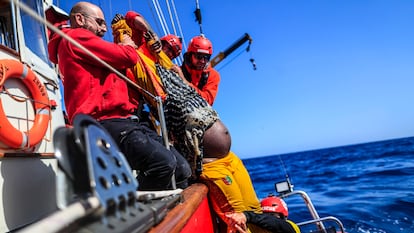
On Monday, the waters of the central Mediterranean were the scene of a shipwreck that did not end in tragedy thanks to a rescue operation by members of Open Arms, a non-profit group from Spain that has carried out high-profile rescues in the past.
The operation took place amid a fresh wave of migrant boats launched from Tunisia over the weekend due to calm seas. Italian authorities have reported three shipwrecks and several dozen people missing. Also on Monday, Tunisian authorities reported recovering 31 bodies, adding to the 17 that were found on Saturday. In just 24 hours between Sunday and Monday morning, 819 migrants rescued from 21 boats arrived in the Italian island of Lampedusa, the main destination for migrant boats along this sea route.
At first it looked like it was going to be a simple operation: the vessel remained afloat and its occupants had diligently put on the life preservers that the lifeguards of the Astral, a rescue ship operated by Open Arms, had handed out to them after approaching their boat in a zodiac. The sea was calm, the sun was out and there was good visibility. All that was left to do was to contact the Italian Coast Guard, in charge of actually picking up the migrants.
And then suddenly, in a matter of about 10 seconds, the boat began sinking before its occupants could be evacuated. All 47 of them survived, but the outcome was very close to ending in tragedy, as witnessed by EL PAÍS reporters on board the Astral.
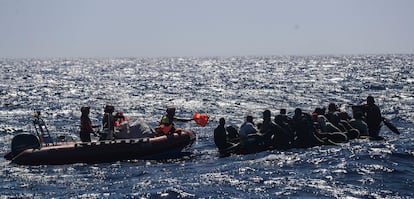
The Astral, flying the British flag, is not authorized to take survivors on board and bring them to port. Its job is to locate boats, inform the Italian Coast Guard about the situation of the passengers, provide them with life jackets and water, check their state of health, and wait with them until Italian authorities send out a rescue ship. Only in extraordinary cases in which the lives of migrants are in imminent danger can they embark them.
That is precisely what has happened on this occasion. “Lampedusa authorities gave us some coordinates where there was a boat that they believed needed medical assistance. We agreed to approach and report on what was happening. We got there and verified that it was overloaded and taking on water. So we were told to embark them and take them to Lampedusa,” says mission chief Esther Camps. But as her crew got to work, the boat disappeared under the water. “It didn’t even capsize or break apart, it simply disappeared.”
One of the survivors is a pregnant woman named Aisha, who was pulled unconscious out of the water. A lifeguard named Amalia Soroeta held her in her arms in the water until the zodiac came for them. Aisha is from Côte d’Ivoire and was traveling in the boat with her sister Agnès. Fatigue got the better of her and she passed out, making rescuers fear that she might be dead. “Open your eyes and cough, keep coughing,” said a nurse named Cristina Merino as she checked Aisha’s vital signs and administered first aid.
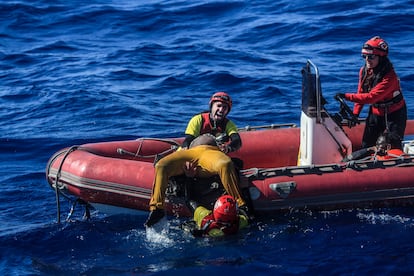
At around 3:00 p.m., there were scenes of chaos in a remote location out at sea, halfway between Tunisia and the Italian island of Lampedusa. There was only water as far as the eye could see in every direction. While the lifeguard Soroeta held the unconscious woman afloat, there were men clinging to tires, kicking and screaming in an effort to keep their heads above the waves. Others, a little further away, looked close to fainting, making rescuers fear for their lives. Among all the agitation, what sounded like the the cry of a baby was heard. A fishing boat approached the scene, and migrants in the water who still had some strength left in them attempted to climb on board.
“At one point, I was afraid that they would all try to climb in and that our boat would capsize,” says Guillermo de la Rosa, the second lifeguard who participated in the rescue operation. “But it was not like that at all. On the contrary, they were well organized, they held on to each other and protected themselves.”
For 30 minutes filled with fear and tension, the crews of the Astral and the fishing boat raced to get all 47 people out of the water alive.
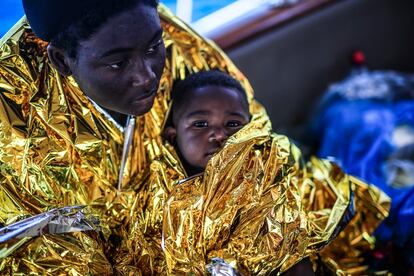
The Astral set sail last Friday from the port of Badalona, in Spain’s northeastern Catalonia region, to participate in search and rescue efforts for migrants adrift in the central Mediterranean at a time when all help seems insufficient: according to the International Organization for Migration (IOM), this first quarter of the year has been the deadliest since 2017, with 46,419 arrivals and at least 579 fatalities, for an accumulated total of nearly 27,000 deaths or disappearances since 2014.
Since the beginning of 2023, 35,085 migrants have arrived on Italian shores, more than four times the number in the same period last year, making Italy the main point of irregular entry into Europe. These figures, which are expected to increase with the good weather, led the Italian government, headed by the far-right Giorgia Meloni, to recently declare a state of emergency in order to make decisions on this matter without going through parliament. One of the first measures is the opening of new repatriation centers to facilitate expulsions.
The immigrants rescued on Monday had left two days earlier from the Tunisian port city of Sfax. They were located by the Astral following a radio warning sent from the drifting boat itself. Among its 47 occupants there were six women, one of them pregnant, a minor and an eight-month-old baby. All the survivors come from countries in sub-Saharan Africa and all had paid around €600 for a spot on the boat. One of the women, 33-year-old Oumou, was traveling alone from Mali, where she left behind an abusive husband and two children. “I am a victim of a forced marriage; I couldn’t take it anymore,” she confessed. Another woman named Aisha breastfed her eight-month-old son, Mohammed, as soon as they got aboard the Astral. The baby was crying and shivering when he was rescued. The men protected themselves from the cold with thermal blankets.
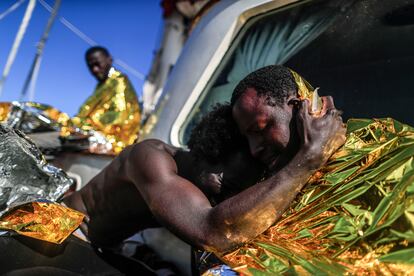
Mohammed, a 25-year-old from Cameroon, says he left his country six years ago after one of his uncles was killed in the violence of the conflict raging in the west of the country. “I first went to Algeria and from there to Morocco, and I tried to enter Spain through the Melilla fence, but I couldn’t. So I decided to try crossing the sea from Tunisia to Italy,” he explains, grinning despite the exhaustion. “I know that Europe is a hard place for Africans, but it cannot be as hard as the Maghreb,” he says, alluding to Arab African countries in the north of the continent. “The Maghrebis are very racist.”
The Astral arrived shortly before 8:00 p.m. at the port of Lampedusa after the captain, Savvas Kourepinis, had obtained authorization to disembark all the migrants. Aisha, the pregnant woman, who kept asking to be allowed to sleep for a while, was the first to come out and was immediately taken to a hospital. Baby Mohammed and his mother were next. Then the rest. Their fate is now in the hands of the authorities and will depend on how anti-immigration laws are applied to them in Meloni’s Italy.
Sign up for our weekly newsletter to get more English-language news coverage from EL PAÍS USA Edition
Tu suscripción se está usando en otro dispositivo
¿Quieres añadir otro usuario a tu suscripción?
Si continúas leyendo en este dispositivo, no se podrá leer en el otro.
FlechaTu suscripción se está usando en otro dispositivo y solo puedes acceder a EL PAÍS desde un dispositivo a la vez.
Si quieres compartir tu cuenta, cambia tu suscripción a la modalidad Premium, así podrás añadir otro usuario. Cada uno accederá con su propia cuenta de email, lo que os permitirá personalizar vuestra experiencia en EL PAÍS.
¿Tienes una suscripción de empresa? Accede aquí para contratar más cuentas.
En el caso de no saber quién está usando tu cuenta, te recomendamos cambiar tu contraseña aquí.
Si decides continuar compartiendo tu cuenta, este mensaje se mostrará en tu dispositivo y en el de la otra persona que está usando tu cuenta de forma indefinida, afectando a tu experiencia de lectura. Puedes consultar aquí los términos y condiciones de la suscripción digital.








































